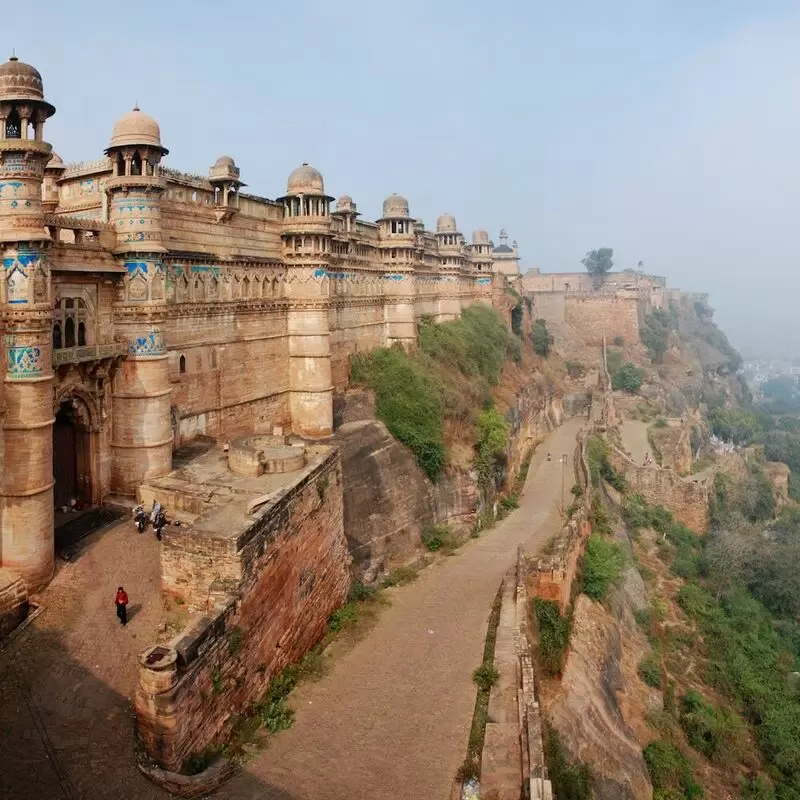
1. Gwalior Fort
Immerse yourself in India's turbulent past at the majestic Gwalior Fort, an 8th-century hilltop fortress adorned with ornate temples and palaces. The ornate blue tiles give the fort a special visual appeal. A true insider will walk up and admire the Jain statues carved into rocks along the way. Don't miss the nightly sound and light show that vividly recounts the fort's rich history. The nearby Gujari Mahal, now an archaeological museum, captivates visitors with its rare artifacts. Enjoy the rich heritage of Gwalior at this site worth seeing.
 Gwalior Fort
Gwalior Fort
Gwalior
Monday - Sunday: 6:00 AM – 5:30 PM

Gwalior
2. HH Maharaja Sir Jiwajirao Scindia Museum
Immerse yourself in India's rich history by visiting the HH Maharaja Sir Jiwajirao Scindia Museum in Gwalior. The museum showcases the Scindia dynasty and houses an impressive collection of antiquities, paintings and sculptures. Don't miss the incredible silver train with cut glass carriages that serve as dessert carts for guests. Just a short walk away is the opulent Jai Vilas Palace, where you can admire royal splendor. Deepen your cultural experience in Gwalior with this museum visit!
 HH Maharaja Sir Jiwajirao Scindia Museum
HH Maharaja Sir Jiwajirao Scindia Museum
Jai Vilas Palace, Lashkar, Gwalior
Monday: Closed
Tuesday - Sunday: 10:00 AM – 5:00 PM

Jai Vilas Palace, Lashkar, Gwalior
Tuesday - Sunday: 10:00 AM – 5:00 PM
3. Gwalior Zoo
Gwalior Zoo, also known as Gandhi Zoological Park, is a paradise for animal lovers. It offers the opportunity to admire an impressive variety of animals, from the Royal Bengal Tiger to the Indian White Peacock, and gives a comprehensive picture of nature. The zoo's main attraction is the majestic albino deer, a rare sight. In addition, the zoo is located just 3 km from the historic Gwalior Fort, making it an ideal base for sightseeing. Tourists often visit both in one day to experience a mix of history and wildlife!
 Gwalior Zoo
Gwalior Zoo
Italian Garden Road, 6559+XPX, Phool Bagh Rd, Phool Bagh, Lashkar, Gwalior
Monday - Sunday: 9:15 AM – 6:30 PM
Friday: Closed

Italian Garden Road, 6559+XPX, Phool Bagh Rd, Phool Bagh, Lashkar, Gwalior
Friday: Closed
4. Sun Temple Gwalior
Immerse yourself in the beauty of the orange splendor of the Sun Temple of Gwalior. This glamorous shrine dedicated to the Sun God is modeled after the famous Sun Temple of Konark in Orissa and is a feast for architecture lovers. The radiance of the temple, known to few tourists, increases at sunrise and sunset, reflecting the magnificent color palettes. Moreover, Gwalior Fort is just a short drive away, another masterpiece of historical significance waiting to be explored.
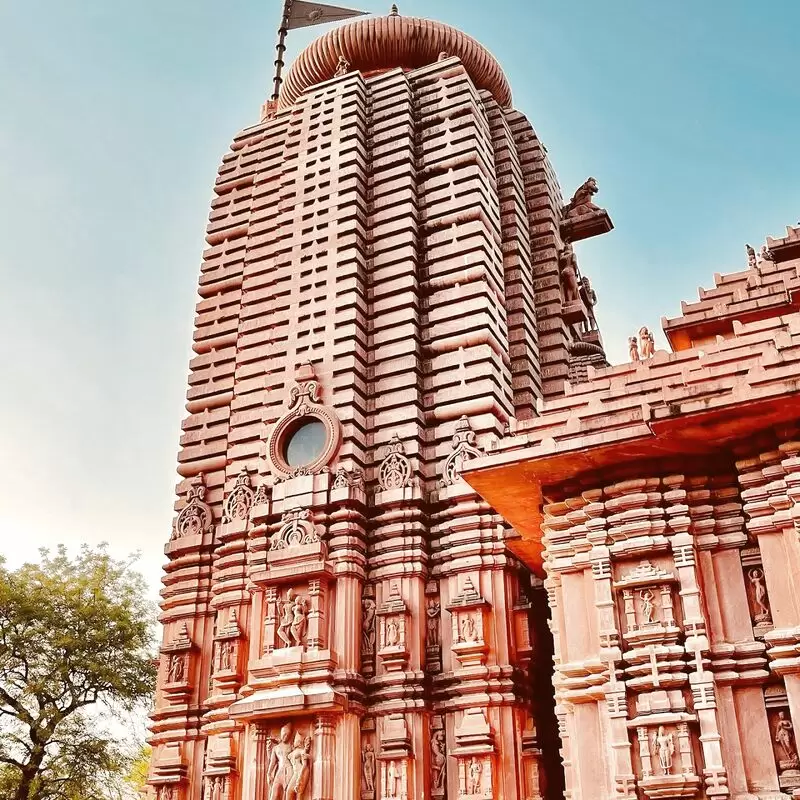 Sun Temple Gwalior
Sun Temple Gwalior
66P9+GFJ, Residency Rd, Mahaveer, Morar, Gwalior
Monday - Sunday: 10:00 AM – 4:00 PM

66P9+GFJ, Residency Rd, Mahaveer, Morar, Gwalior
5. Gurudwara Data Bandi Chhor Sahib
The Gurudwara Data Bandi Chhod is a site full of history and emotion that must be seen. This serene Sikh holy site commemorates the generous act of Guru Hargobind Sahib, who freed 52 kings from captivity. Marvel at the distinctive architecture and the radiant golden Sikhara. Be sure to enjoy the delicious "langar" food served here. Just a short drive away is the magnificent Gwalior Fort, which offers breathtaking views of the city. Discover the city's past: every stone here tells a story!
 Gurudwara Data Bandi Chhor Sahib
Gurudwara Data Bandi Chhor Sahib
Fort, Gwalior
Monday - Sunday: Open 24 hours

Fort, Gwalior
6. Jai Vilas Palace
Experience the royal splendor of Jai Vilas Palace, a stunning example of architectural splendor in Gwalior! Marble basins, lavish carpets and golden furnishings testify to the prosperity of the Scindia dynasty. Don't miss the world's largest pair of chandeliers in the Durbar Hall! After discovering this royal gem, explore the nearby Gwalior Fort, perched on a hill and offering breathtaking views of the city.
 Jai Vilas Palace
Jai Vilas Palace
Jai Vilas Palace, Lashkar, Gwalior
Monday: Closed
Tuesday - Sunday: 10:00 AM – 6:00 PM

Jai Vilas Palace, Lashkar, Gwalior
Tuesday - Sunday: 10:00 AM – 6:00 PM
7. Gujari Mahal
Immerse yourself in the rich history of Gwalior and visit Gujari Mahal, a 15th century palace. It is a testament to the love of Raja Man Singh for his queen Mrignayani. Don't miss the Shalabhanjika statue, a priceless artifact that demonstrates supreme craftsmanship. A short walk away is the imposing Gwalior Fort, which offers a magnificent panoramic view of the city, where the echoes of brave stories can still be heard in every corner.
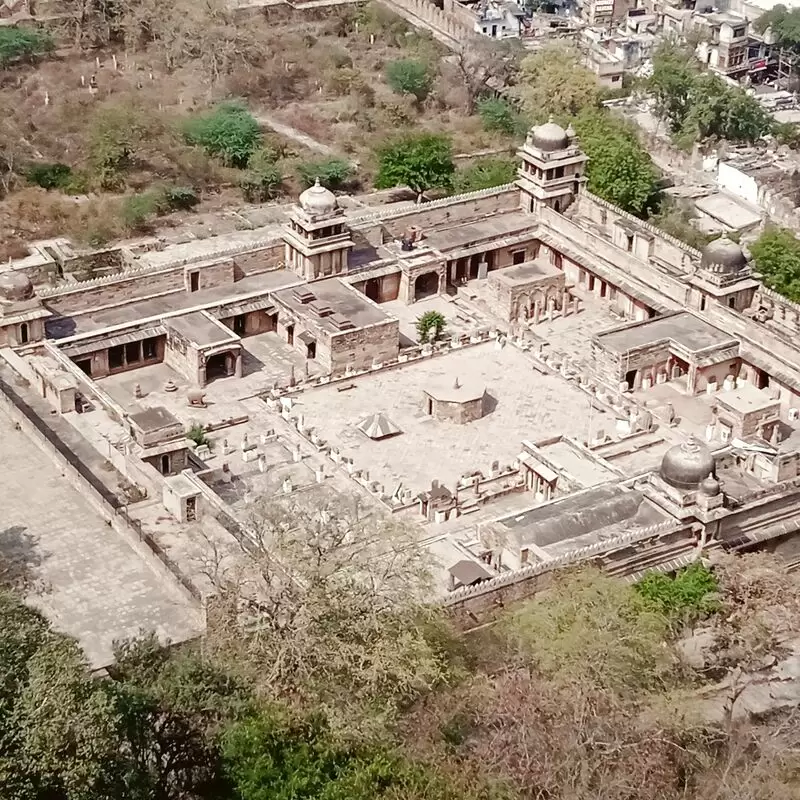 Gujari Mahal
Gujari Mahal
Lohamandi, Gwalior
Monday: Closed
Tuesday - Sunday: 10:00 AM – 5:00 PM

Lohamandi, Gwalior
Tuesday - Sunday: 10:00 AM – 5:00 PM
8. Tomb of Tansen
The Tomb of Tansen in Gwalior is a melodic tribute to the legendary musician at Akbar's court. The architectural elegance of the Mughals, nestled in tranquil gardens, will captivate you. An insider tip: visit it during the Tansen Music Festival to enjoy the flavor of the local music scene! Just a stone's throw away is the mausoleum of Ghaus Mohammad, another Mughal testimony worth seeing. A perfect harmony of history and melody awaits you!
 Tomb of Tansen
Tomb of Tansen
Gwalior,, Tansen Nagar, Gwalior
Monday - Sunday: 9:00 AM – 6:00 PM

Gwalior,, Tansen Nagar, Gwalior
9. Tighra Dam
A visit to the Tighra Dam in Gwalior is an absolute must for nature lovers. This picturesque reservoir with its lush greenery and sparkling water is perfect for boat rides and picnics. What makes it special are the breathtaking sunsets - a spectacle that captivates everyone. Few people know it, but if you are lucky, you can also see some water birds. Nearby, only 14 km away, you can visit Madhav National Park and observe the wildlife there.
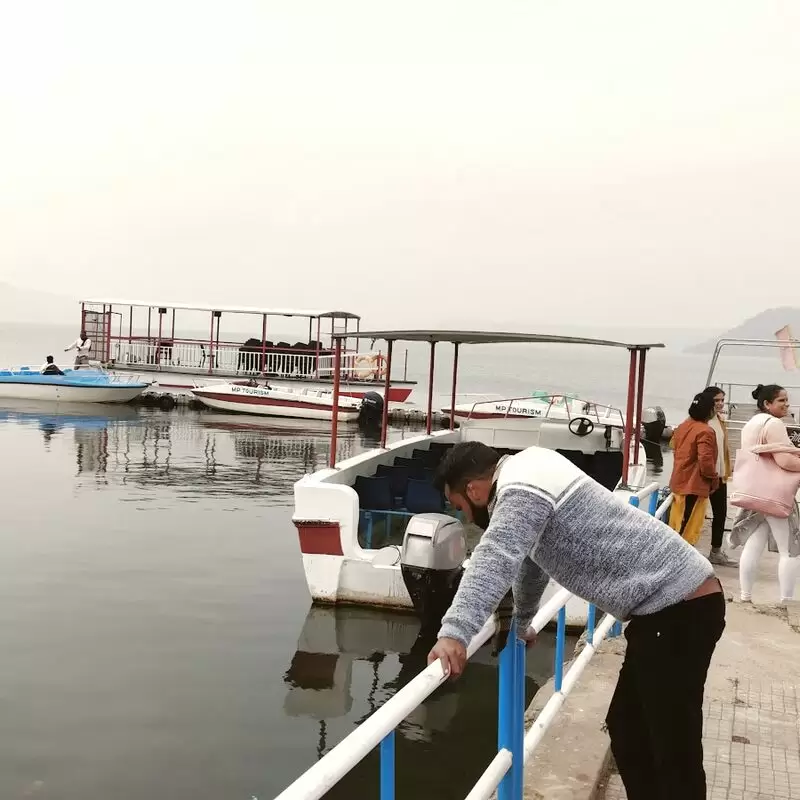 Tighra Dam
Tighra Dam
6294+8PF, Gwalior
Monday - Thursday: 9:30 AM – 6:30 PM
Friday: 9:00 AM – 6:30 PM
Saturday - Sunday: 9:30 AM – 7:30 PM

6294+8PF, Gwalior
Friday: 9:00 AM – 6:30 PM
Saturday - Sunday: 9:30 AM – 7:30 PM
10. Gopachal Parvat
Steeped in history and spirituality, Gopachal Parvat in Gwalior houses a series of massive rock-cut Jain sculptures dating from the 7th to 15th centuries. It is a microcosm of India's rich heritage and offers a breathtaking panoramic view of the city, illuminated at sunset. This place is often overlooked by tourists and offers a peaceful break from city life. Nearby is the historic Gwalior Fort - take a day to explore both of these fascinating sights.
 Gopachal Parvat
Gopachal Parvat
Phulbagh Rd, 6578+RX2, Gopachal Marg, Lashkar, Gwalior

Phulbagh Rd, 6578+RX2, Gopachal Marg, Lashkar, Gwalior
11. Italian Garden
A visit to the Italian Garden in Lashkar, Gwalior, is like a trip to a piece of Europe, in the middle of India. Carefully manicured lawns, colorful flower beds, and charming fountains make it a lush, tranquil retreat. It's also a great place for photography. Enjoy a relaxing stroll, marvel at the beautifully landscaped gardens or simply read a book in peace. In addition, Gwalior Fort, a historic fort with panoramic views of the city, is just a short drive away.
 Italian Garden
Italian Garden
6559+8PM, Italian Garden Rd, Phool Bagh, Lashkar, Gwalior
Monday - Sunday: 6:00 – 9:00 AM, 5:00 – 8:00 PM
Saturday: 6:00 – 9:00 AM, 2:00 – 8:00 PM

6559+8PM, Italian Garden Rd, Phool Bagh, Lashkar, Gwalior
Saturday: 6:00 – 9:00 AM, 2:00 – 8:00 PM
12. Siddhanchal Jain Temple Caves
Venture into the mystical Jain temple caves of Siddhanchal! This sacred site, with its beautifully detailed carvings, offers a spiritual journey back to the 7th century. As you explore, you'll find 26 caves dedicated to the Jain Tirthankaras; don't miss the greatest idol of Bhagwan Parshvanath. Tucked away on the south side of the Gwalior Fort, it's a quiet haven from the hustle and bustle of the city. Another plus is the breathtaking panorama of the city of Gwalior on the way up. Nearby is the historic Chaturbhuj Temple, an architectural gem well worth a visit.
 Siddhanchal Jain Temple Caves
Siddhanchal Jain Temple Caves
Ancient Digamber Jain Temple, 65F7+FQX, Gwalior Fort, Gwalior
Monday - Sunday: Open 24 hours

Ancient Digamber Jain Temple, 65F7+FQX, Gwalior Fort, Gwalior
13. Baijataal
Baijataal in Gwalior is a must for history and architecture lovers. This sprawling garden with its beautiful two-story building showcases the royalty of the Scindia era. The Baijataal also hosts various cultural events and is an idyllic spot for photography enthusiasts. Just a short walk away is the magnificent Jai Vilas Palace, which perfectly completes your journey through India's rich cultural heritage. The picturesque surroundings offer you a fascinating experience off the beaten track.
 Baijataal
Baijataal
655C+6J7, Moti Mahal Rd, Lashkar, Gwalior
Monday - Sunday: Open 24 hours

655C+6J7, Moti Mahal Rd, Lashkar, Gwalior
14. Amma Maharaj Ki Chhathri
Immerse yourself in the splendor of Gwalior's rich history at the Amma Maharaj Ki Chhathri. Dedicated to the Maharani of Madho Rao Scindia, this architectural marvel showcases the exclusive cultural heritage of the Scindia dynasty. The stunning frescoes and mythological paintings are a blend of Hindu and Islamic architecture and will take your breath away! Just a stone's throw away is the opulent Jai Vilas Palace, which boasts the largest chandeliers in the world and fascinating royal artifacts full of stories.
 Amma Maharaj Ki Chhathri
Amma Maharaj Ki Chhathri
55W9+J4P, Maharana Pratap Nagar, Lashkar, Gwalior
Monday - Sunday: 5:30 AM – 7:00 PM

55W9+J4P, Maharana Pratap Nagar, Lashkar, Gwalior
15. Jahangir Mahal Gwalior Fort
A living testament to India's glorious history, the Jahangir Mahal at Gwalior Fort embodies architectural excellence with its ornate carvings and grand design. Admire the stunning facade, which glows with breathtaking colors at dusk, highlighting its timeless charm. Insider tip: Don't miss the breathtaking panoramic view of the city that you can enjoy from here! Just a leisurely stroll away is Mansingh Palace, another historical gem worth visiting. Gwalior Fort is not just a monument, but a fascinating journey into India's past.
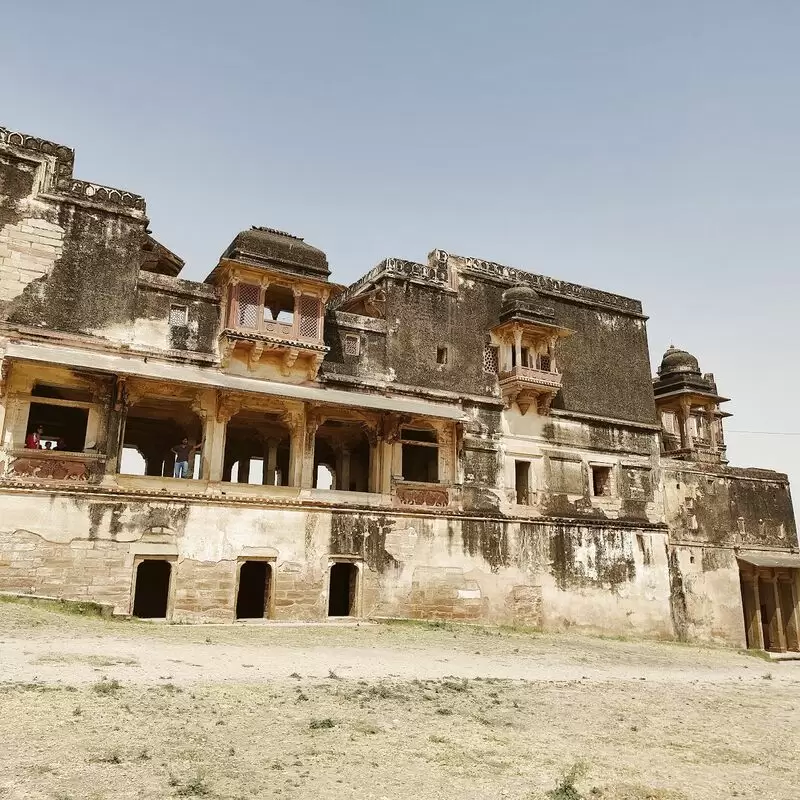 Jahangir Mahal Gwalior Fort
Jahangir Mahal Gwalior Fort
Near Maan Singh Palace Fort Campus Gwalior Fort, 65M9+2X6, Gwalior Fort, Gwalior
Monday - Sunday: Open 24 hours

Near Maan Singh Palace Fort Campus Gwalior Fort, 65M9+2X6, Gwalior Fort, Gwalior
16. Splash The Sun City
Splash The Sun City" in Gwalior is an absolute delight for water lovers. The exciting array of water slides, wave pools and rain dances guarantees a fun-filled day for kids and adults alike. Enjoy local delicacies at the park's food stalls. Don't miss the rain disco, a unique attraction of the park. The park's proximity to Gwalior's main attractions, the impressive Gwalior Fort and the historic Jai Vilas Palace, makes it an ideal stopover to cool off after exploring the city.
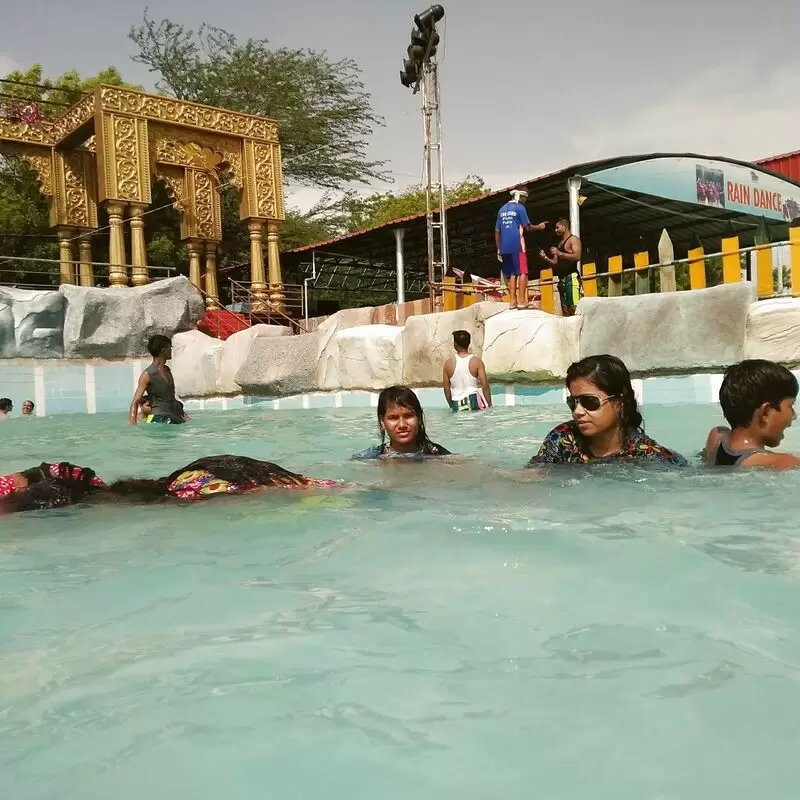 Splash The Sun City
Splash The Sun City
Race Course Road, 66G5+X7M, Mela Ground, Thatipur, Gwalior
Monday - Sunday: 2:00 – 6:00 PM

Race Course Road, 66G5+X7M, Mela Ground, Thatipur, Gwalior
17. Chaturbhuj Temple
Dive deep into Indian history and visit the Chaturbhuj Temple in Gwalior. This temple with its extraordinary sculptures is a great example of Oriya style architecture. A special attraction is the "Garbhagriha", a sanctuary that shows the spiritual depth of India. It surrounds you with serenity and weaves an inimitable story of ancient traditions. Just a short drive away is the iconic Gwalior Fort - don't miss the mesmerizing light and sound show that reflects the city's remarkable heritage! Enjoy this historic pair for a truly enriching experience.
 Chaturbhuj Temple
Chaturbhuj Temple
Gwalior Ghati, Gwalior Fort, 65J9+9W9, Gwalior Fort, Gwalior
Monday - Sunday: Open 24 hours

Gwalior Ghati, Gwalior Fort, 65J9+9W9, Gwalior Fort, Gwalior
18. Archaeological Museum
A visit to the Archaeological Museum is a must for history buffs. Within its walls you will find a treasure trove of artifacts from different periods of Indian history. Discover ancient sculptures, pottery, inscriptions and coins that offer fascinating insights into the rich cultural heritage. Not only are the artifacts fascinating, but so is the architecture of the museum itself. It is just a stone's throw from the great Gwalior Fort, so you can include both in your day's program.
 Archaeological Museum
Archaeological Museum
65J9+2F8, Fort Rd, near Man Mandir Palace, Fort Campus, Gwalior
Monday - Sunday: 9:00 AM – 5:00 PM
Friday: Closed

65J9+2F8, Fort Rd, near Man Mandir Palace, Fort Campus, Gwalior
Friday: Closed
19. Urvai gate gwalior fort
In Gwalior, the iconic Urvai Gate is a must-see, serving as an imposing entrance to the majestic Gwalior Fort. Its rich history, impressive architecture and enchanting stories captivate travelers. You will be enthralled by the surrounding rock sculptures, especially the fascinating figures of the Jain Tirthankars. Locals believe that whispered wishes can come true here! Just a few steps away you will find the Saas Bahu Temples, a fantastic blend of religious sanctity and architectural brilliance. Visit them and immerse yourself in the cultural essence of this ancient city.
 Urvai gate gwalior fort
Urvai gate gwalior fort
65C6+9CJ, Fort View Colony, Gwalior

65C6+9CJ, Fort View Colony, Gwalior
20. Ramaua Dam
Experience the tranquility amidst nature at Ramaua Dam in Gwalior. It is known for its calming aura and is the perfect place for picnics and evenings outdoors. Birdwatchers will be amazed by the variety of native species. This hidden gem offers a magnificent sight at sunset that you should not miss! For photography enthusiasts, the reflection of the sky on the water is absolutely perfect. Quench your historical thirst at Suraj Kund, which is just a short drive away.
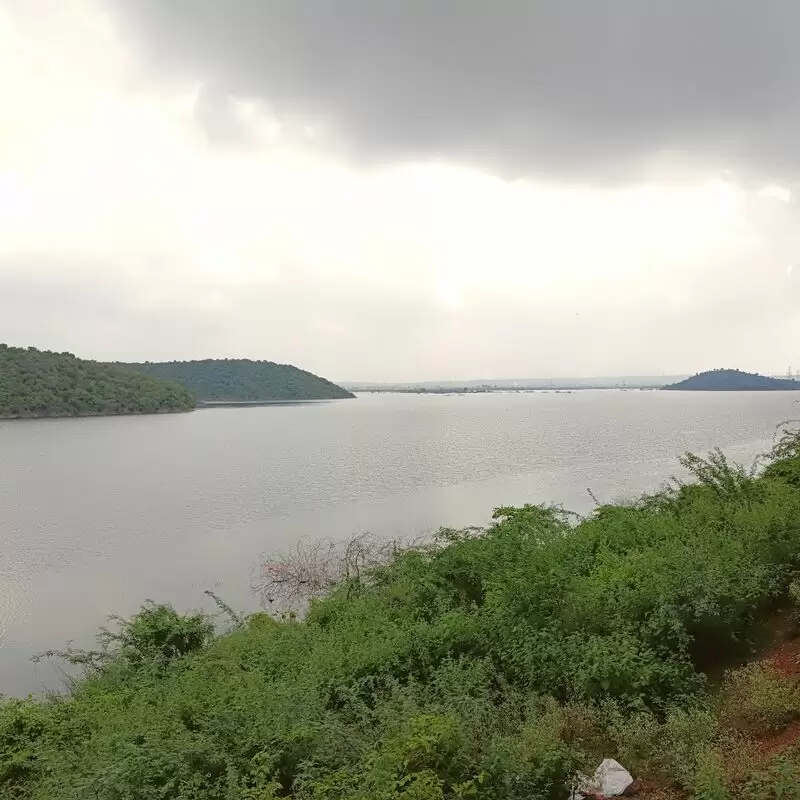 Ramaua Dam
Ramaua Dam
565F+QJX, Dongarpur Rd, Ramaua

565F+QJX, Dongarpur Rd, Ramaua
21. Assi Khamba Ki Bawadis
A visit to Assi Khamba Ki Baoris is a must for history and architecture lovers. This historic stepped well has a fascinating structure of more than 80 pillars - a testament to the wonder of ancient Indian engineering. It is a little off the beaten path and offers a unique insight into the local way of life. Not far from here are also the magnificent Gwalior Fort and the lively Chaturbhuj Temple, so you can combine several cultural treasures in a single trip.
 Assi Khamba Ki Bawadis
Assi Khamba Ki Bawadis
65H9+J9R, Gwalior Fort, Gwalior

65H9+J9R, Gwalior Fort, Gwalior
22. Tansen Maqbara
A visit to the "Tansen Maqbara" or "Tomb of Tansen" in Gwalior is a must, especially for music lovers. It is the resting place of Tansen, one of the "Nine Jewels" at the court of Mughal Emperor Akbar and a key figure in Indian classical music. The Maqbara showcases the distinctive architectural splendor of the Mughals and is the site of an annual music festival that attracts performers from around the country. Pro-Tip: This tour can be ideally combined with a visit to the nearby Gwalior Fort, further enriching your cultural discovery tour.
 Tansen Maqbara
Tansen Maqbara
65JH+JMR, Tansen Nagar, Gwalior
Monday - Sunday: 5:00 AM – 7:00 PM

65JH+JMR, Tansen Nagar, Gwalior
23. Kala Vithika
A visit to Gwalior is incomplete without a trip to Kala Vithika, a living museum that showcases the region's impressive culture, art and history. Amidst the rich heritage of Madhya Pradesh, ancient tribal paintings and colorful old pottery are brought to life here. An insider's tip? Don't miss the occasional folk dance performances. Near Kala Vithika is the legendary Gwalior Fort with its lavish architecture, adding to your historical journey through the city.
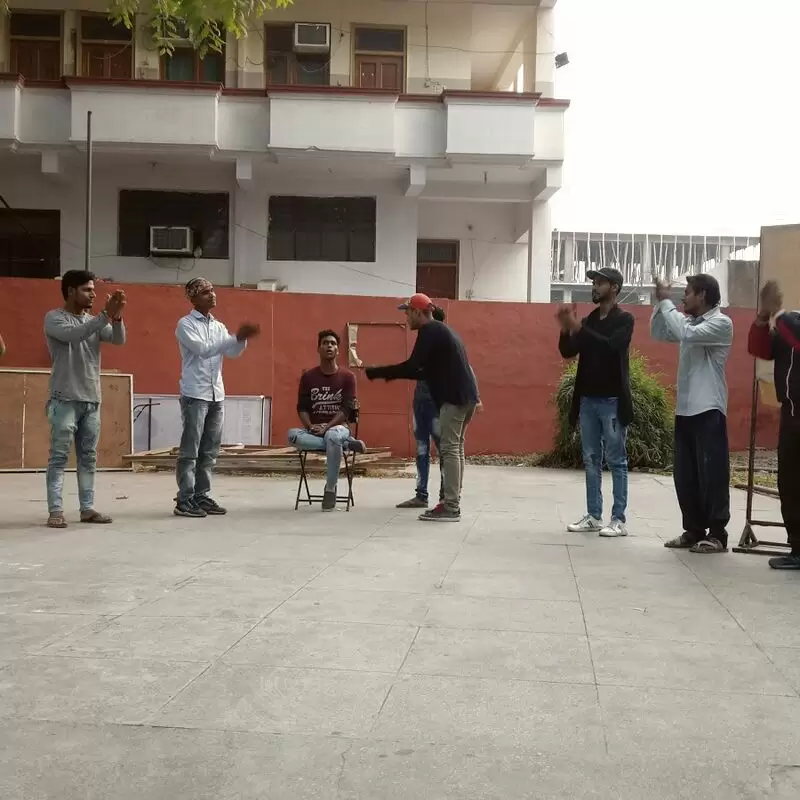 Kala Vithika
Kala Vithika
656G+RXJ, S K V Rd, Basant Vihar Colony, Lashkar, Gwalior

656G+RXJ, S K V Rd, Basant Vihar Colony, Lashkar, Gwalior
Best Time to Visit Gwalior
The best time to visit Gwalior is between October and March during the pleasant winter season. Temperatures vary between 1°C and 22°C and are ideal for sightseeing and exploring the city's historical monuments. Another good time is in February during the Tansen Music Festival.
Annual Weather in Gwalior
January
Jan
51 / 76 °F
10 / 24 °C
0
2
111
February
Feb
56 / 87 °F
14 / 31 °C
0
1
103
March
Mar
67 / 99 °F
20 / 37 °C
0
1
128
April
Apr
78 / 111 °F
26 / 44 °C
0
1
111
May
May
86 / 112 °F
30 / 44 °C
0
2
115
June
Jun
89 / 110 °F
32 / 43 °C
1
4
94
July
Jul
83 / 97 °F
29 / 36 °C
3
16
36
August
Aug
80 / 93 °F
27 / 34 °C
3
17
30
September
Sep
78 / 96 °F
26 / 36 °C
2
10
65
October
Oct
72 / 95 °F
22 / 35 °C
0
2
113
November
Nov
63 / 87 °F
17 / 30 °C
0
1
112
December
Dec
54 / 78 °F
12 / 26 °C
0
1
116
Questions & Answers
What is the local language spoken in Gwalior?
The main language in Gwalior is Hindi, the most widely spoken language in India. The dialect used in the region is Braj Bhasha, also called Braj Bhakha, which is very similar to spoken Hindi but more influenced by Sanskrit and Rajasthani. English is also understood and spoken by a large part of the population, especially those working in the tourism industry and the educated classes.
Is Gwalior safe for solo travelers?
Yes, Gwalior is generally considered safe for solo travelers. The locals are friendly and helpful, and the basic precautions one would take as a solo traveler should suffice. There are regular police patrols and well-lit streets in the city. However, as in any other place, it is important to keep personal belongings safe and avoid secluded areas late at night, especially if you are traveling alone and are a woman. It is always advisable to be alert and aware of your surroundings.
What is the traditional cuisine of Gwalior?
In Gwalior, traditional cuisine offers a generous mix of sweet and savory delicacies. A must-try is Morena Gajak, a popular sweet made from sesame seeds. Bhutte Ka Kees, a street food made from grated corn kernels, is also popular among locals. Gwalior's cuisine is influenced by Rajputana and Mughlai cultures, and thus offers a variety of flavorful dishes such as kebabs and biryani. Traditional meals usually consist of roti, dal, sabzi and rice.
What is the most common mode of transportation?
In Gwalior, auto and cycle rickshaws, which are available in almost all parts of the city, are the most common mode of transportation. They are an easy and affordable way to get around the city. For longer distances, it is also common to hire a cab or cab. Alternatively, some locals and tourists also use public transportation such as buses and trains. However, it should be noted that these means of transportation can be crowded during peak hours.
Is Gwalior tourist-friendly?
Yes, Gwalior is very tourist friendly. It is a magnificent city with a rich cultural heritage and offers various attractions such as the Gwalior Fort, Jaivilas Palace and numerous temples. All these attractions are easily accessible, with tourist-friendly facilities and English-speaking guides. The city also hosts lively festivals, the local cuisine is delicious and the locals are hospitable, adding to the tourist experience. However, for a smooth and enjoyable visit, it is always good to have some knowledge of local customs and traditions.
How can I communicate if I only speak English?
While Hindi is the main language in Gwalior, English is often used for business and tourism purposes. Many residents, especially in the tourism industry, are proficient in English. Therefore, you should be able to communicate in English with ease. However, understanding and learning some basic Hindi words or phrases could enrich your experience. Also, take a translation app with you for a smoother experience.
Is it easy to navigate around the city?
Yes, it is relatively easy to get around Gwalior, India, as it is a well-structured city with good public transportation. The city offers a variety of travel options such as auto rickshaws, buses and cabs. If you want to explore the city on your own, you can also rent a car or a bike. The locals are very helpful and friendly, which makes it even easier to find your way around the city. Always remember to have a city map or a reliable GPS app at hand.
Is tap water safe to drink?
In Gwalior, as in many other places in India, it is generally not advisable to consume tap water directly. Despite significant advances in sterilization and purification processes, tap water may still contain contaminants and organisms that can cause illness, especially for foreign travelers unaccustomed to local water. It is strongly recommended that you only drink bottled water from approved brands or water that has been thoroughly boiled and cooled. Always make sure the seal on bottled water is not broken before drinking.
Are credit cards widely accepted?
Yes, credit cards are accepted at most hotels, restaurants and stores in Gwalior, India. However, it is important that you also have some Indian rupees with you, as smaller vendors, rickshaw drivers and local markets may not accept cards. Also, credit cards are less likely to be accepted in rural or less touristy areas. Therefore, it is advisable to always have a mix of payment options with you.
Is there any local etiquette I should be aware of?
When visiting Gwalior, remember to dress modestly, especially when visiting places of worship. It is considered respectful to greet the older generation with a Namaste (hands in prayer position). Always use the right hand to receive or give things, as the left hand is considered unclean in Indian tradition. Do not point your feet at anyone or any deity as this is considered disrespectful. It is customary to remove your shoes before entering temples or houses.
What is the city's historical significance?
Gwalior, also known as the "fortress city," has been an integral part of numerous north Indian kingdoms throughout India's history, including the Gurjar Pratihara, the Kachchhapaghatas, the Tomars, the Mughals, and the Marathas. The enormous fortress on the hill testifies to its strategic importance. The city also played an important role in the modern history of India, serving as the main site of the Indian uprising of 1857 and the Indian national movement.
Is there a city pass for local attractions?
Currently, there is no consolidated city pass for local attractions in Gwalior. Visitors usually buy individual tickets for each sight. These include historical monuments such as Gwalior Fort, Jai Vilas Palace Museum, Gujari Mahal and Tansen's Tomb. The cost may vary depending on the sight. It is always advisable to check online or at your accommodation for the latest information before visiting.
What is the dress code for visiting religious sites?
When visiting religious sites in Gwalior, India, it is important to dress modestly. Both men and women should cover their shoulders and knees. Avoid revealing or tight clothing. Wearing traditional Indian clothing such as a kurta or sari is encouraged but not required. Many Hindu temples require you to remove your shoes before entering as a sign of respect. Always be aware of local customs and traditions to ensure that you treat the sanctity of the place with respect.
How should I dress to blend in with locals?
In Gwalior, men usually wear shirts and pants, while women usually wear traditional Indian clothing such as sarees or salwar kameez. However, due to the influence of Western culture, jeans and T-shirts are also common. When visiting religious sites, dress conservatively and cover arms and legs. Light cotton clothing is recommended in summer and warm clothing in winter. Always remove your shoes when entering religious sites. Remember to dress respectfully to honor local culture and customs.
How can I stay healthy in Gwalior?
Take care of your health in Gwalior by drinking bottled water in the first place, as tap water may not be safe. Avoid street food and eat in hygienic places to avoid stomach upset. It is also advisable to take precautions against mosquitoes as they can transmit diseases such as dengue and malaria. Be sure to dress appropriately for the weather - humidity can be high, so wear light, breathable clothing to avoid heat stroke or exhaustion. Always carry hand sanitizer and take care of your personal hygiene.
Are there reliable medical facilities in Gwalior?
Yes, Gwalior has a number of reliable medical facilities. The city is home to several highly rated hospitals, clinics and pharmacies that are well-equipped and offer high-level healthcare services. These include the larger facilities such as G.R Medical College and JAH Hospital. There are also private hospitals and specialty clinics for cardiology, orthopedics and other medical fields. Trained medical professionals ensure that global standards are met. Healthcare in Gwalior covers everything from general medicine to critical health services.
Can I rent a car in Gwalior?
Of course, you can rent a car in Gwalior as there are several car rental companies in the city. These companies offer a wide range of vehicles to choose from, depending on your budget and preferences. The drivers provided are usually local and familiar with the routes and popular tourist destinations in the city. However, make sure you have a driver's license and other required documents if you want to drive yourself. Prices vary depending on the vehicle chosen and the duration of the rental.
Do I need to have a visa to visit Gwalior?
Visa requirements for entry into Gwalior, like the rest of India, depend on your nationality. All foreign visitors except citizens of Nepal and Bhutan require a visa to enter India. It is recommended to apply online for an e-visa valid for tourist, business or medical visits. Please check with your local Indian embassy or consulate well in advance of your trip for specific visa requirements.
How is the internet accessibility in the city?
Gwalior, a major city in the heart of India, offers good internet connectivity. The city is equipped with a variety of internet service providers offering high-speed broadband and mobile data services. Most hotels, restaurants, cafes and public areas offer free Wi-Fi services for the convenience of visitors. However, internet speeds may vary depending on the location in the city. It is recommended to purchase a local SIM card for uninterrupted internet services.
Are there any specific vaccines required before travelling to Gwalior?
Before traveling to Gwalior, India, it is recommended to get vaccinated against hepatitis A and typhoid fever due to the risk of contaminated food or water. Depending on the length of travel, type of trip and specific activities, travelers should also get vaccinated against hepatitis B, rabies and Japanese encephalitis. It is important to have routine vaccinations such as MMR, DTP and chickenpox refreshed. Always consult a physician or travel clinic for individualized advice.
Is there any wildlife I should be aware of?
Gwalior, while not known for its wildlife, is home to Madhav National Park in the nearby Shivpuri district, which is home to animals such as jackal, nilgai, sambar and chital. Bird lovers can enjoy migratory birds like geese, pintail ducks and teals. Reptiles such as pythons, cobras and kraits can also be encountered here. However, all these encounters take place in a controlled environment where experts ensure your safety.
How can I respect the local culture and traditions?
While in Gwalior, India, show respect for the local culture by dressing conservatively, removing your shoes before entering temples or homes, avoiding public displays of affection, and asking permission before photographing people or sacred sites. Learn a few phrases in Hindi to show your interest in the language. Respect the customs, traditions and religious beliefs of the locals, especially during festivals and ceremonies. Always show reverence for your elders, as this is an important aspect of Indian culture.
Are there local guide services available?
Yes, in Gwalior, India, there are indeed local tour guides. They offer comprehensive tours and experiences that help you dive deep into the local culture, history and cuisine. These professional guides are well-versed in the history of the region and often share lesser-known stories and facts during the tours. You can book these services at your hotel, through travel agencies or directly with independent local tour guides.
How much should I tip in restaurants?
Tipping in restaurants in Gwalior, as in most parts of India, is not mandatory but appreciated. While an average service charge of about 10% is usually included in the bill, you can tip extra depending on the quality of service. About 5-10% of the total bill is a common amount. However, give the tip directly in cash to the person serving you to show immediate gratitude. Finally, tipping is largely a personal choice and is not enforced.
What are popular local festivals or traditions in Gwalior?
Gwalior, a city rich in culture and heritage, celebrates numerous festivals with great zeal. The most popular is the Tansen Music Festival, which is a tribute to the legendary musician Tansen. The fascinating performances of famous Indian classical musicians attract music lovers from all over the world. Gwalior also hosts the grand Gwalior Trade Fair, which features local crafts, cuisine and entertainment. In addition, traditional Indian festivals such as Diwali, Holi and Dussehra are celebrated with much pomp and show, representing the vibrant culture of the city.
Can I drink alcohol in public places?
As in many other parts of India, drinking alcohol in public is discouraged in Gwalior to maintain social decorum and avoid public nuisance. While there is no specific ban on drinking in public places, it can lead to disapproval or even legal consequences. Therefore, it is recommended that alcohol only be consumed in licensed venues such as bars, restaurants, or private rooms where it is permitted. Drinking in public may be considered a violation of the law and may result in fines or arrest.
What sports are popular in Gwalior?
Cricket is very popular in Gwalior, as it is in the rest of India. The city has even hosted international cricket matches at the Captain Roop Singh Stadium. Equally important, Gwalior is a center for traditional Indian sports. Kho-kho, kabaddi and wrestling often attract a lot of local interest. In addition, athletics, tennis, and badminton are also promoted in the city, and there are facilities throughout the city to promote these sports. Scindia School, a renowned institution in Gwalior, is particularly known for its emphasis on sports and physical education.
Are drones allowed in Gwalior?
Drones are generally allowed in India, including in Gwalior, but with certain restrictions. The Directorate General of Civil Aviation (DGCA) has regulations for drone operations. You must obtain permission through the Digital Sky Platform. Drones are not allowed to be flown near airports, international borders, coastlines, military installations, and certain other areas with high security or privacy requirements. It is always advisable to check the latest guidelines before planning a drone flight.
How is the nightlife in Gwalior?
Nightlife in Gwalior may not be as vibrant as in other major cities, but it offers a distinct cultural experience. Local theater performances, traditional music and dance performances offer tourists an immersive experience of Indian culture. For those seeking casual nightlife, there are a handful of restaurants and cafes open late, serving delicious traditional Indian cuisine and international dishes. Some hotels also host live music events. All in all, nightlife in Gwalior is a tranquil experience full of cultural engagement.
What are acceptable modes of public behavior in Gwalior?
In Gwalior it is important to respect local customs and traditions. Indians value politeness and modesty. Therefore, it is advisable to be respectful in conversation and to dress appropriately, covering shoulders and knees, especially in religious sites. Public displays of affection are not very common, and it is customary to greet others with Namaste - palms together and a slight bow. Remember to remove your shoes when entering religious buildings or homes. Tipping is customary in restaurants and for services. Use your right hand when eating and greeting others.
Feedback
I hope you found this article informative and helpful. I'm eager to improve the content and make it even more valuable for you. If you have any feedback or suggestions, I would love to hear from you.
Do you have any tips or hidden gems that you think should be added to the list? Are there any areas that you feel could use more explanation or clarification?
Your input is greatly appreciated and will help us to continue providing high-quality content that meets your needs and interests. Please feel free to share your thoughts.
What is the local language spoken in Gwalior?
The main language in Gwalior is Hindi, the most widely spoken language in India. The dialect used in the region is Braj Bhasha, also called Braj Bhakha, which is very similar to spoken Hindi but more influenced by Sanskrit and Rajasthani. English is also understood and spoken by a large part of the population, especially those working in the tourism industry and the educated classes.
Is Gwalior safe for solo travelers?
Yes, Gwalior is generally considered safe for solo travelers. The locals are friendly and helpful, and the basic precautions one would take as a solo traveler should suffice. There are regular police patrols and well-lit streets in the city. However, as in any other place, it is important to keep personal belongings safe and avoid secluded areas late at night, especially if you are traveling alone and are a woman. It is always advisable to be alert and aware of your surroundings.
What is the traditional cuisine of Gwalior?
In Gwalior, traditional cuisine offers a generous mix of sweet and savory delicacies. A must-try is Morena Gajak, a popular sweet made from sesame seeds. Bhutte Ka Kees, a street food made from grated corn kernels, is also popular among locals. Gwalior's cuisine is influenced by Rajputana and Mughlai cultures, and thus offers a variety of flavorful dishes such as kebabs and biryani. Traditional meals usually consist of roti, dal, sabzi and rice.
What is the most common mode of transportation?
In Gwalior, auto and cycle rickshaws, which are available in almost all parts of the city, are the most common mode of transportation. They are an easy and affordable way to get around the city. For longer distances, it is also common to hire a cab or cab. Alternatively, some locals and tourists also use public transportation such as buses and trains. However, it should be noted that these means of transportation can be crowded during peak hours.
Is Gwalior tourist-friendly?
Yes, Gwalior is very tourist friendly. It is a magnificent city with a rich cultural heritage and offers various attractions such as the Gwalior Fort, Jaivilas Palace and numerous temples. All these attractions are easily accessible, with tourist-friendly facilities and English-speaking guides. The city also hosts lively festivals, the local cuisine is delicious and the locals are hospitable, adding to the tourist experience. However, for a smooth and enjoyable visit, it is always good to have some knowledge of local customs and traditions.
How can I communicate if I only speak English?
While Hindi is the main language in Gwalior, English is often used for business and tourism purposes. Many residents, especially in the tourism industry, are proficient in English. Therefore, you should be able to communicate in English with ease. However, understanding and learning some basic Hindi words or phrases could enrich your experience. Also, take a translation app with you for a smoother experience.
Is it easy to navigate around the city?
Yes, it is relatively easy to get around Gwalior, India, as it is a well-structured city with good public transportation. The city offers a variety of travel options such as auto rickshaws, buses and cabs. If you want to explore the city on your own, you can also rent a car or a bike. The locals are very helpful and friendly, which makes it even easier to find your way around the city. Always remember to have a city map or a reliable GPS app at hand.
Is tap water safe to drink?
In Gwalior, as in many other places in India, it is generally not advisable to consume tap water directly. Despite significant advances in sterilization and purification processes, tap water may still contain contaminants and organisms that can cause illness, especially for foreign travelers unaccustomed to local water. It is strongly recommended that you only drink bottled water from approved brands or water that has been thoroughly boiled and cooled. Always make sure the seal on bottled water is not broken before drinking.
Are credit cards widely accepted?
Yes, credit cards are accepted at most hotels, restaurants and stores in Gwalior, India. However, it is important that you also have some Indian rupees with you, as smaller vendors, rickshaw drivers and local markets may not accept cards. Also, credit cards are less likely to be accepted in rural or less touristy areas. Therefore, it is advisable to always have a mix of payment options with you.
Is there any local etiquette I should be aware of?
When visiting Gwalior, remember to dress modestly, especially when visiting places of worship. It is considered respectful to greet the older generation with a Namaste (hands in prayer position). Always use the right hand to receive or give things, as the left hand is considered unclean in Indian tradition. Do not point your feet at anyone or any deity as this is considered disrespectful. It is customary to remove your shoes before entering temples or houses.
What is the city's historical significance?
Gwalior, also known as the "fortress city," has been an integral part of numerous north Indian kingdoms throughout India's history, including the Gurjar Pratihara, the Kachchhapaghatas, the Tomars, the Mughals, and the Marathas. The enormous fortress on the hill testifies to its strategic importance. The city also played an important role in the modern history of India, serving as the main site of the Indian uprising of 1857 and the Indian national movement.
Is there a city pass for local attractions?
Currently, there is no consolidated city pass for local attractions in Gwalior. Visitors usually buy individual tickets for each sight. These include historical monuments such as Gwalior Fort, Jai Vilas Palace Museum, Gujari Mahal and Tansen's Tomb. The cost may vary depending on the sight. It is always advisable to check online or at your accommodation for the latest information before visiting.
What is the dress code for visiting religious sites?
When visiting religious sites in Gwalior, India, it is important to dress modestly. Both men and women should cover their shoulders and knees. Avoid revealing or tight clothing. Wearing traditional Indian clothing such as a kurta or sari is encouraged but not required. Many Hindu temples require you to remove your shoes before entering as a sign of respect. Always be aware of local customs and traditions to ensure that you treat the sanctity of the place with respect.
How should I dress to blend in with locals?
In Gwalior, men usually wear shirts and pants, while women usually wear traditional Indian clothing such as sarees or salwar kameez. However, due to the influence of Western culture, jeans and T-shirts are also common. When visiting religious sites, dress conservatively and cover arms and legs. Light cotton clothing is recommended in summer and warm clothing in winter. Always remove your shoes when entering religious sites. Remember to dress respectfully to honor local culture and customs.
How can I stay healthy in Gwalior?
Take care of your health in Gwalior by drinking bottled water in the first place, as tap water may not be safe. Avoid street food and eat in hygienic places to avoid stomach upset. It is also advisable to take precautions against mosquitoes as they can transmit diseases such as dengue and malaria. Be sure to dress appropriately for the weather - humidity can be high, so wear light, breathable clothing to avoid heat stroke or exhaustion. Always carry hand sanitizer and take care of your personal hygiene.
Are there reliable medical facilities in Gwalior?
Yes, Gwalior has a number of reliable medical facilities. The city is home to several highly rated hospitals, clinics and pharmacies that are well-equipped and offer high-level healthcare services. These include the larger facilities such as G.R Medical College and JAH Hospital. There are also private hospitals and specialty clinics for cardiology, orthopedics and other medical fields. Trained medical professionals ensure that global standards are met. Healthcare in Gwalior covers everything from general medicine to critical health services.
Can I rent a car in Gwalior?
Of course, you can rent a car in Gwalior as there are several car rental companies in the city. These companies offer a wide range of vehicles to choose from, depending on your budget and preferences. The drivers provided are usually local and familiar with the routes and popular tourist destinations in the city. However, make sure you have a driver's license and other required documents if you want to drive yourself. Prices vary depending on the vehicle chosen and the duration of the rental.
Do I need to have a visa to visit Gwalior?
Visa requirements for entry into Gwalior, like the rest of India, depend on your nationality. All foreign visitors except citizens of Nepal and Bhutan require a visa to enter India. It is recommended to apply online for an e-visa valid for tourist, business or medical visits. Please check with your local Indian embassy or consulate well in advance of your trip for specific visa requirements.
How is the internet accessibility in the city?
Gwalior, a major city in the heart of India, offers good internet connectivity. The city is equipped with a variety of internet service providers offering high-speed broadband and mobile data services. Most hotels, restaurants, cafes and public areas offer free Wi-Fi services for the convenience of visitors. However, internet speeds may vary depending on the location in the city. It is recommended to purchase a local SIM card for uninterrupted internet services.
Are there any specific vaccines required before travelling to Gwalior?
Before traveling to Gwalior, India, it is recommended to get vaccinated against hepatitis A and typhoid fever due to the risk of contaminated food or water. Depending on the length of travel, type of trip and specific activities, travelers should also get vaccinated against hepatitis B, rabies and Japanese encephalitis. It is important to have routine vaccinations such as MMR, DTP and chickenpox refreshed. Always consult a physician or travel clinic for individualized advice.
Is there any wildlife I should be aware of?
Gwalior, while not known for its wildlife, is home to Madhav National Park in the nearby Shivpuri district, which is home to animals such as jackal, nilgai, sambar and chital. Bird lovers can enjoy migratory birds like geese, pintail ducks and teals. Reptiles such as pythons, cobras and kraits can also be encountered here. However, all these encounters take place in a controlled environment where experts ensure your safety.
How can I respect the local culture and traditions?
While in Gwalior, India, show respect for the local culture by dressing conservatively, removing your shoes before entering temples or homes, avoiding public displays of affection, and asking permission before photographing people or sacred sites. Learn a few phrases in Hindi to show your interest in the language. Respect the customs, traditions and religious beliefs of the locals, especially during festivals and ceremonies. Always show reverence for your elders, as this is an important aspect of Indian culture.
Are there local guide services available?
Yes, in Gwalior, India, there are indeed local tour guides. They offer comprehensive tours and experiences that help you dive deep into the local culture, history and cuisine. These professional guides are well-versed in the history of the region and often share lesser-known stories and facts during the tours. You can book these services at your hotel, through travel agencies or directly with independent local tour guides.
How much should I tip in restaurants?
Tipping in restaurants in Gwalior, as in most parts of India, is not mandatory but appreciated. While an average service charge of about 10% is usually included in the bill, you can tip extra depending on the quality of service. About 5-10% of the total bill is a common amount. However, give the tip directly in cash to the person serving you to show immediate gratitude. Finally, tipping is largely a personal choice and is not enforced.
What are popular local festivals or traditions in Gwalior?
Gwalior, a city rich in culture and heritage, celebrates numerous festivals with great zeal. The most popular is the Tansen Music Festival, which is a tribute to the legendary musician Tansen. The fascinating performances of famous Indian classical musicians attract music lovers from all over the world. Gwalior also hosts the grand Gwalior Trade Fair, which features local crafts, cuisine and entertainment. In addition, traditional Indian festivals such as Diwali, Holi and Dussehra are celebrated with much pomp and show, representing the vibrant culture of the city.
Can I drink alcohol in public places?
As in many other parts of India, drinking alcohol in public is discouraged in Gwalior to maintain social decorum and avoid public nuisance. While there is no specific ban on drinking in public places, it can lead to disapproval or even legal consequences. Therefore, it is recommended that alcohol only be consumed in licensed venues such as bars, restaurants, or private rooms where it is permitted. Drinking in public may be considered a violation of the law and may result in fines or arrest.
What sports are popular in Gwalior?
Cricket is very popular in Gwalior, as it is in the rest of India. The city has even hosted international cricket matches at the Captain Roop Singh Stadium. Equally important, Gwalior is a center for traditional Indian sports. Kho-kho, kabaddi and wrestling often attract a lot of local interest. In addition, athletics, tennis, and badminton are also promoted in the city, and there are facilities throughout the city to promote these sports. Scindia School, a renowned institution in Gwalior, is particularly known for its emphasis on sports and physical education.
Are drones allowed in Gwalior?
Drones are generally allowed in India, including in Gwalior, but with certain restrictions. The Directorate General of Civil Aviation (DGCA) has regulations for drone operations. You must obtain permission through the Digital Sky Platform. Drones are not allowed to be flown near airports, international borders, coastlines, military installations, and certain other areas with high security or privacy requirements. It is always advisable to check the latest guidelines before planning a drone flight.
How is the nightlife in Gwalior?
Nightlife in Gwalior may not be as vibrant as in other major cities, but it offers a distinct cultural experience. Local theater performances, traditional music and dance performances offer tourists an immersive experience of Indian culture. For those seeking casual nightlife, there are a handful of restaurants and cafes open late, serving delicious traditional Indian cuisine and international dishes. Some hotels also host live music events. All in all, nightlife in Gwalior is a tranquil experience full of cultural engagement.
What are acceptable modes of public behavior in Gwalior?
In Gwalior it is important to respect local customs and traditions. Indians value politeness and modesty. Therefore, it is advisable to be respectful in conversation and to dress appropriately, covering shoulders and knees, especially in religious sites. Public displays of affection are not very common, and it is customary to greet others with Namaste - palms together and a slight bow. Remember to remove your shoes when entering religious buildings or homes. Tipping is customary in restaurants and for services. Use your right hand when eating and greeting others.
Feedback
I hope you found this article informative and helpful. I'm eager to improve the content and make it even more valuable for you. If you have any feedback or suggestions, I would love to hear from you.
Do you have any tips or hidden gems that you think should be added to the list? Are there any areas that you feel could use more explanation or clarification?
Your input is greatly appreciated and will help us to continue providing high-quality content that meets your needs and interests. Please feel free to share your thoughts.
I hope you found this article informative and helpful. I'm eager to improve the content and make it even more valuable for you. If you have any feedback or suggestions, I would love to hear from you.
Do you have any tips or hidden gems that you think should be added to the list? Are there any areas that you feel could use more explanation or clarification?
Your input is greatly appreciated and will help us to continue providing high-quality content that meets your needs and interests. Please feel free to share your thoughts.

